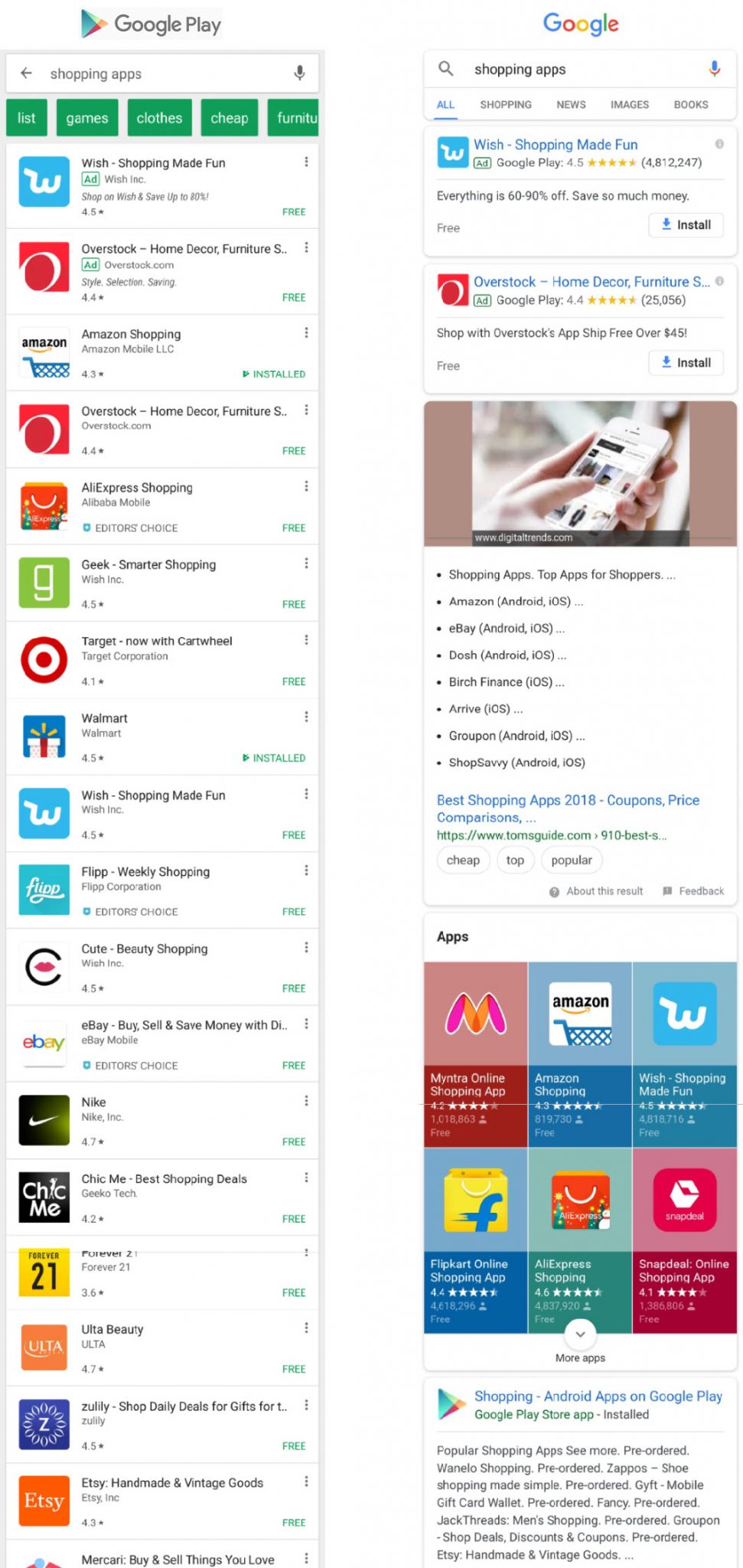Apps for iOS and Android mobile devices represent a chance to sell to captive prospects — if they can find your app to download in the first place.

Google Android mobile app search options: the Google Play Store (left) and Google web search.
The first place to start is the Google Play Store, where Android users install apps. Google web search is another opportunity for app queries, but most of the optimization focus should be on the Play Store itself.
Before dismissing this article as irrelevant because you don’t have a mobile app, take a minute to search for your brand in the Play Store. Even if you don’t have an app, others might have made apps using your brand name as a promotional tactic. Competitors can also show up for searches for your brand, even if they don’t mention it.
A search for Eddie Bauer on the Play Store turns up competitor REI instead. L.L.Bean has an app imposter that created a game with the brand’s name as the title. And ezShop Outdoors made an app that allows you to shop and compare prices across multiple brands, including L.L.Bean.
Google Play Store Optimization
The opportunities for app search in the Google Play Store are similar (if somewhat limited) to optimizing for traditional web search.
The title of the app and the description, along with the app publisher’s name, are the only searchable elements on the page.
The title is tricky — it’s the name of the application. That means that you’ll have to resist the urge to name your app solely after your brand. Include your most important keyword in the app’s name.
The app’s name also needs to fit within 50 characters, including spaces. If you’re developing a similar app for the iTunes App Store, keep in mind that its app-name character limit is stingier: only 30.
The Play Store’s description is somewhat easier because you have a lot more characters to play with — 4,000 as of this writing. The description should contain relevant and popular keywords that describe the purpose and function of your app.
Place the most popular keywords that describe your core value proposition up front, because they carry more weight and because impatient app searchers may only read a few lines before making a decision.
Unfortunately, Google doesn’t offer a tool that shows what people search for on the Play Store. Use another keyword tool, such as Google Keyword Planner, as a proxy to generate the short list of phrases to include in your 4,000 characters.
Like web search algorithms, the Play Store incorporates elements of quality and authority. There is some research that shows that the number of installs and reviews impacts Play Store search. This poses a problem. An app needs to be found to be installed and reviewed. But how can it acquire more installs and reviews without first being found?
The answer is to start small with less competitive keywords. Collect installs and reviews, and then gradually increase the popularity of the keywords you’re targeting. Like all SEO, this is not a one-time effort. It takes time and patience to bring an app to the top of the rankings heap in such a cluttered environment.
Google Web Search Optimization
The good news is that web search has the same textual needs as the Play Store. The same keyword research applies. And optimizing the app’s name and description are key to better rankings in web search.
In addition, having a link from your ecommerce site to your app listing on the Play Store is critical. This could be in the footer of your site, for example, next to the links to Facebook and other social profiles.
Consider where you want searchers to land when they find your app in web search results. Should it be on a page on your ecommerce site that describes your app, or on your listing on the Google Play Store, to download the app?
Send all that link authority from the footer of your site directly to your Play Store listing with a direct link. Forget about creating a page on your site about the app — all the imagery, videos, and descriptive, promotional text that you would put on your site should be on your Play Store listing anyway.
Use the link authority and textual relevance where it matters most: on your Play Store listing where searchers can download the app. Don’t hijack them to a page on your site where they just have to click again to get to the store to install.
The more steps you make searchers take, the more likely you are to lose those conversions.
Links from other sites are also important in a web search for apps, like they are for all rankings. See which pages are ranking for the keyword phrases you want to dominate.
Can you create better content on your own site than what’s already ranking? How about partnering with an influencer site that’s ranking well? If the ranking content is a list of reviews of similar apps, approach the author with a pitch to include your app in that list, or in a future list. In the same vein, think of story ideas that you could pitch.
Are there authoritative directories that curate quality apps? If they already rank well, you want to be a part of them. But steer clear if they don’t rank for anything besides the word “directory,” or if they will take any app that pays a fee. Associating with low-quality directories — and other low-quality sites — may contribute to a poor link profile, which could trigger a penguin algorithm penalty.
You can also do some competitive research. Dig into your competitors’ backlink profiles to identify high-value sites that could link to your app store listing, as well.





